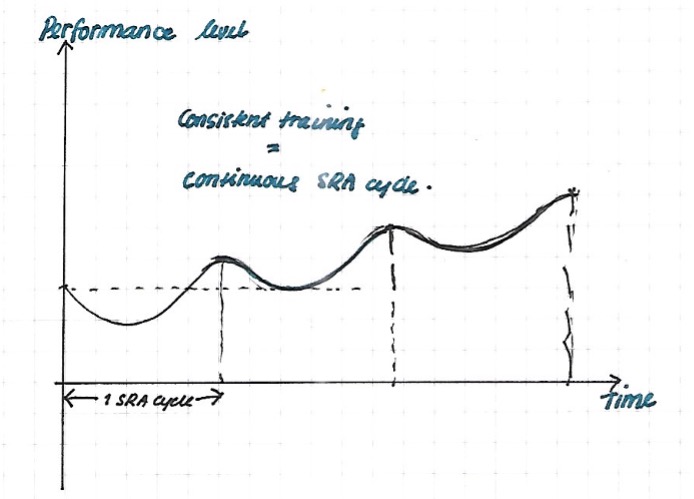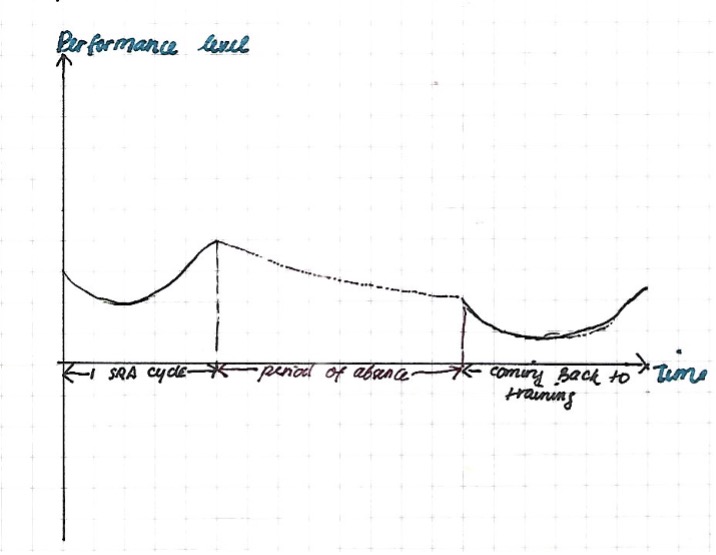
Returning to the gym after a nine-day holiday with my family was rough. Even though I used lighter weights, my workouts felt like a struggle. Unfortunately, a few of my clients, whose training was interrupted because of my holiday, also experienced the same thing. Some were unpleasantly surprised because they didn’t expect a much harder session after a short layoff, which begs the question: why does this happen? This article will explore why our post-holiday performance may regress, making the comeback workouts feel more challenging than expected. This concept can also be applied to short breaks due to sickness or other reasons because life happens. Let’s dive in.
Skill and Practice
After a hiatus from strength training, our bodies require a period of readjustment. The first aspect to discuss is our skill. Skills are honed by practice, or they will slowly reduce to a baseline if not being used. It’s akin to taking a break from playing the guitar—your fingering might be a bit rusty, causing you to miss a few notes when you start again.
Our consistency in training allows us to practice the movement pattern repeatedly. Taking a break from training might make us feel rusty upon our comeback. But fret not; we possess an incredible ability to regain that movement efficiency, infamously called muscle memory. Muscle memory is a misnomer because the muscles don’t store any memory of our movement; all they do is to either contract or relax. It is the neural pathways of the movement so that we can recalibrate to pre-holiday aptitude again.
While most people can regain that movement skill almost immediately after a short break, sometimes small deviations happen here and there. Unfortunately, sometimes, those small details that reduce efficiency go unnoticed. Having a coach to spot deviations can be beneficial in getting you up and running again quickly while maintaining proper form.
Cardio and Conditioning Level
Secondly, cardiovascular fitness might suffer during the holiday, especially if lounging on the beach with a cocktail is more your holiday style than long hikes on the mountain. I, for one, indulged in more eating and drinking than my usual intake without any additional physical activity.
Your Cardio-Respiratory Endurance (CRE) level, or simply your conditioning level, affects your work capacity and recovery rate between sets and workouts. This is true despite strength training, considered to be a high-intensity workout, is mainly fueled by the phosphagen system and fast glycolysis.
This anaerobic energy system, called cytosolic energy system, has high power output but runs out quickly. The conditioning works promotes development of your mitochondria, which host the aerobic respiratory. When you rest, the aerobic energy system helps to recharge that cytosolic energy system back to baseline.
The better your conditioning level, the better your recharge rate between sets. If you have a fixed workout duration, would you rather come back under the bar with a full charge or half charge? Deconditioned from your holiday, you don’t have a choice but to come back half-charged, and you do it set after set. Sounds horrible, yes?
It’s not hard to guess what needs to be done better to avoid a severe reduction in your conditioning level. But, in case I need to say it, let’s start maintaining some level of physical activity and, if possible, do some light exercises.
However, your conditioning will also return quickly within a week or two. It’s accepted in the strength training community (especially Starting Strength) that it will take roughly two weeks to build back to an acceptable level of conditioning. In Rippetoe’s words, “A conditioning adaptation changes the metabolic environment in the cells without the need for the large-scale tissue remodeling necessary for a strength adaptation. Conditioning comes on quickly, is easy to maintain, and goes away just as quickly.”
In a Starting Strength Forum Q&A, Will Morris, who was active in the US Army, explained that he used to “practice” with two runs before a his army physical test to get better results. I also need to point out that strength training elevates your conditioning level, especially if you are as strong as Will, who squats 400 lbs.
Strength Performance and SRA Cycle

The graph above shows your typical Stress-Recovery-Adaptation Cycle while training. On the y-axis is your level of performance – in this case, we are measuring strength. And on the x-axis is time.
When you train, you experience stress from the workout, which can lead to a temporary dip in performance. Imagine trying to squat heavy for a few days in a row; you will not be thrilled from the second day onwards. That’s because there was some muscle breakdown on a cellular level, and we need time to recover from it. Fortunately, if the stress is enough (but not too much), we will recover and adapt to a higher performance baseline. If this continues, the cycle will repeat, and after the performance drops, you will achieve a higher performance level again and again.
Then, you stop training for a while.
Unfortunately, our bodies are very efficient. They will say to themselves, “Keeping this level of performance is expensive! Let’s just cut it loose! We can use fewer calories and protein to maintain it! This lazy bum doesn’t need it anyway.”

When that happens, your level of performance starts dipping down again. And the longer you stay away from training, the more it will decrease. Compounding this with lack of practice and decreased conditioning, you’ll feel that the first few training sessions can be tougher than they should be.
The Solutions
All roads lead to Rome. Depending on your situation, I can suggest many ways to regain your old training performance level. Of course, each solution might have pros and cons.
Option A: Keep training during the holiday!
Pros: You’re maintaining your gains!
Cons: Your spouse will hate you for it.
Option B: Enjoy your holiday!
Pros: Your spouse will NOT hate you for it!
Cons: You are reading this article.
Seeing it through a short-term lens
If you don’t train during the holiday, your performance will drop, and depending on your training level, you may need a few sessions to a few weeks to get back to where you’re at. It’s just how it is; the sooner you accept it, the better.
Quickly return to training after your holiday, and start slowly. The first one might feel sucky, but after a few sessions, you will return to the groove and start building momentum. Enjoy the ride, and don’t worry about the weight decrease when you return!
Seeing it through a long-term lens
I am not giving excuses for being inconsistent with training. However, most of us do strength training for long-term health benefits. Missing a couple of weeks of workouts a year because you are enjoying yourself on holiday will not significantly impact your long-term progress and health. Sometimes, that short escape can even help us to feel excited about training again!
Bonus: You can now easily lift your luggage without worrying about your back!
Now, back to training!

